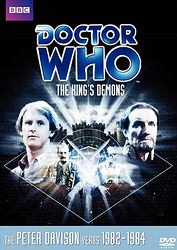
 |  |  |

 | Reviews for The King's Demons |
|
 |  |  |
There is 1 review so far. To add a review of your own for this item, visit the voting page.
 |  |  |

 | Good showcase for Peter Davison |
|
 |  |  |
| By: | Don Klees, Silver Spring, United States |
|
| Date: | Saturday 7 April 2018 |
|
| Rating: |    7 7 |
When I started watching Doctor Who over 30 years ago, Tom Baker was The Doctor. When I say that, I don't just mean that he was the fourth actor to play the Doctor or the current star of the series. He was The Doctor, plain and simple. Baker's persona was so forceful that I couldn't imagine that anyone had been The Doctor before him, let alone that anyone would be - or even could be - after him.
As a side effect of this, when I finally saw his successor, the much lower key Peter Davison, I found him a bit underwhelming. By the time I got to watch more than a few of Davison's episodes, I'd already seen Colin Baker in the role and decided that the next Doctor was more to my liking and that initial impression solidified into a firm judgment - Davison had been in some great stories but was not himself a great Doctor.
It would be many years and DVD purchases (not to mention several audio stories for Big Finish) later until I took the time to revisit that view. Interestingly, it was some of the less respected stories from Davison's tenure that made me appreciate him the most. In a story like Caves of Androzani, where nearly every element of the production is top-notch, even a strong performance like Davison's doesn't necessarily stand out. In contrast, the more lightweight stories sometimes allow a viewer to appreciate what he brings to the part. A case in point is 1983's The King's Demons, which is often ranked with Timeflight as one of the show's worst stories. Though not a classic piece of TV by any stretch, it's still a fun way to spend an hour. In fact, compared to some stories of Davison's tenure, it's aged rather well.
Thanks to the historical setting, there are few if any of the fashion victims that sometimes make futuristic episodes hard to enjoy. Plus, even though the golden-age of BBC costume drama was a few years in the past by this point, they still had the ability to create convincing period settings that looked far more impressive than you'd expect with the kind of tight budget a two-part Doctor Who story would have had in the early 80s. This combination allows one to focus on the story and performances on their own terms.
The King's Demons' narrative faults are fairly easy targets. As the Doctor himself points out, the Master's plot is "small-time villainy", some of the historical background is a bit shaky, and the resolution is somewhat lacking in drama. That said, the process of getting to that resolution is actually quite enjoyable, especially the build up of a historical mystery that takes place over the course of the first episode. Some of that sense of intrigue inevitably falls by the wayside once the Master's involvement is revealed, but even then there are enough questions posed to keep things lively. Ultimately, you get the sense that the story's bad reputation is less about the weaknesses of the story itself but rather because it wasn't especially ambitious.
If so, that's a shame because there's a actually lot to appreciate, particularly with the acting. Both the series regulars and guest stars like Gerald Flood give strong performances. Even Anthony Ainley - perhaps benefitting from a plot that doesn't involve universal Armageddon, is in good form. The key to the story, though, is Davison. In this story, you can truly appreciate the quiet conviction Davison brings to his performance as The Doctor, holding the viewers' attention without drawing attention to himself. When you see him in action - never overwhelmed and quietly putting the pieces together in a way Tom Baker seldom had the patience for - there's no question about who's driving the story.
In that respect, The King's Demons calls to mind some of the historical stories from William Hartnell's tenure as the Doctor, where both time and budgets were even tighter and much of the audience wanted nothing more than non-stop Daleks. Like Hartnell, even when his Doctor is in the thick of history, Davison makes it clear that this is his show. I've realized - better late than never - that this a very good thing.


